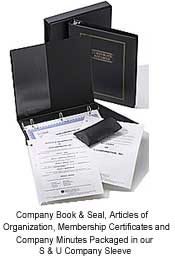THANKS FOR INQUIRING!
Just think - you can form a Limited Liability Company
right over the Phone, or Online. It's easy. It's quick.
And you'll save a substantial amount of money.
CALIFORNIA DELAWARE FLORIDA ILLINOIS NEVADA NEW JERSEY NEW YORK
WHAT’S A LIMITED LIABILITY COMPANY?
The Limited Liability Company (“LLC”) is a hybrid entity that is very flexible and, depending on how many owners (known as “Members”) and what such Members elect to do, may be taxed as a partnership or corporation, if it has multiple Members, or as a sole proprietorship, if it has only one member, while providing limited liability protection for all of its Members. For federal tax purposes, an LLC, like a partnership or sole proprietorship, is a pass-through entity; thus, its income and losses are taxed only at the member level. However, all members of an LLC, like the shareholders of an S corporation, have limited liability for the debts and claims against the LLC. No member will be burdened with the personal liability.
The main advantage of the LLC is that it is not burdened with the ownership restrictions imposed on a small business corporation (also known as a Sub Chapter S Corporation). An LLC may have more than 100 Members or as few as one. Its interests may be held by corporations, partnerships, Non Resident Aliens, trusts, pension plans and charitable organizations; the LLC may make special allocations, thereby avoiding the single class of stock requirement applicable to an S corporation; and it may own more than 80% of the stock of a corporation and, therefore, may be a member of an affiliated group.
The Members of the LLC become owners of the Company by putting capital (making a “Capital Contribution”) into the Company in exchange for a Membership Interest, which is expressed as a percentage. Typically, the allocation of profits and losses are proportionate to the Membership Interest. The Capital Contribution can be money, real estate, equipment, future service (“sweat equity”) etc., and if it is something other than money, it should be assigned a value agreed upon by the Members. For example, Bill and Mike want to set up a company to operate a retail athletic goods store. Bill puts in $51,000 and Mike will work 60 hours next year managing the store and his sweat equity will have an agreed upon value of $49,000
The LLC is operated by Managers that handle the day-to-day activities of the LLC. The Managers may be all of the Members, some of the Members, or it may even be managed by a person or entity that has no ownership interest in the company. Since such a non-Member Manager will not share in the profits and losses, perhaps they will be paid a salary or commission as agreed upon in a Management Agreement.
For tax purposes, an LLC taxed as a partnership or sole proprietorship may have advantages over a Subchapter S Corporation with respect to the amount of deductible losses. The amount of a Subchapter S Corporation shareholder's deductible losses is limited to the sum of the shareholder's basis in his stock and any loans from the shareholder to the corporation. In contrast, a partner can deduct losses in an amount up to the sum of the basis in the partnership interest, the allocable share of partnership income, and his allocable share of qualifying partnership debt.
How the taxes work is simple. For example, each of 10 individuals contribute $100,000 to a newly formed entity to acquire an office building. The entity borrows from a bank an additional $5,000,000 as the balance of the building's $6,000,000 purchase price. If the entity is taxed as a Subchapter S Corporation, each shareholder's loss deductions are limited to $100,000. However, if the entity is an LLC taxed as a partnership, each member can deduct losses up to $600,000 ($100,000 basis plus $500,000 share of the entity's debt). These losses may then be used by the individuals to offset other income they may have from other sources.
For one low fee, your Limited Liability Company is COMPLETE and What's the secret to such great prices? Flexible payment options available for placing your order. |  |
Our Office
Miami
1840 Coral Way
4th Floor
Miami, FL 33145
Toll Free: (800) 603 - 3900
(305) 854-6000
Fax: (305) 857-3700
Natalia Utrera, Esq.,
Managing Attorney
New York City
1 Maiden Lane
5th Floor
New York, NY 10038
Toll Free: (800) 576-1100
(212) 962-1000
Fax: (212) 964-5600
Nicolas Spigner, Esq.
Managing Attorney
Clifton, NJ
642 Broad St., Suite 1B
Clifton, NJ 07013
Toll Free: (888) 336-8400
(973) 473-2000
Fax: (973) 778-2900
Sandy A. Adelstein
Managing Attorney
Los Angeles
8939 S Sepulveda Blvd.
Suite 400
Los Angeles, CA 90045
Toll Free: (888) 520-7800
(310) 258-9700
Fax: (310) 258-9400
Nicolas Spigner, Esq.
Managing Attorney
Delaware
9 East Loockerman Street
Suite 202
Dover, DE 19901
Toll Free: (888) 641-3800
(302) 744-9800
Fax: (302) 674-2100
Courtney Riordan, Esq.
Managing Attorney
Las Vegas
2545 Chandler Avenue
Suite 4
Las Vegas, NV 89120
Toll Free: (888) 530 4500
(702) 364 2200
Fax: (702) 458 2100
Joel S. Beck, Esq.
Managing Attorney
Chicago
Continental Office Plaza, Suite L12
2340 Des Plaines River Road
Des Plaines, IL 60018
Toll Free: (888) 514-9800
(312) 443-1500
Fax: (312) 443-8900
Michael C. Welchko, Esq.
Managing Attorney
General Counsel Club®
Unlimited Legal & Business Advice
LEARN MORE!
Toll Free: 1 (800) 734 - 9900
Fax: 1 (800) 520 - 7800
ClubAssist@AmeriLawyer.com
Natalia Utrera, Esq.,
Managing Attorney

STARTING A BUSINESS
There are many benefits to starting a business and incorporating. Some of the benefits of starting a business include protection of your personal assets, ease of raising capital, gain anonymity, available tax benefits and more!
Copyright © 2022 Spiegel & Utrera, P. A. All Rights Reserved

